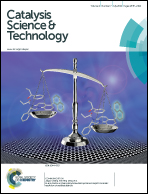Novel cobalt zinc oxide Fischer–Tropsch catalysts synthesised using supercritical anti-solvent precipitation
Abstract
Cobalt zinc oxide catalysts have been prepared by anti-solvent precipitation in supercritical CO2 and investigated for CO hydrogenation. Here we show how the textural and catalytic properties of the catalyst can be tailored by the addition of water to the initial solution of cobalt and zinc acetates in methanol. Characterization of the catalysts by powder X-ray diffraction, infra-red and Raman spectroscopy showed that in the absence of water a high surface area mixed acetate was produced which upon calcination formed wurtzite type Zn1−xCoxO and spinel type ZnxCo3−xO4. The addition of 5 vol.% water resulted in a phase separated Co3O4/ZnO catalyst and enhanced active cobalt surface area as a result of disruption of the solvent/CO2 phase equilibrium during precipitation.


 Please wait while we load your content...
Please wait while we load your content...